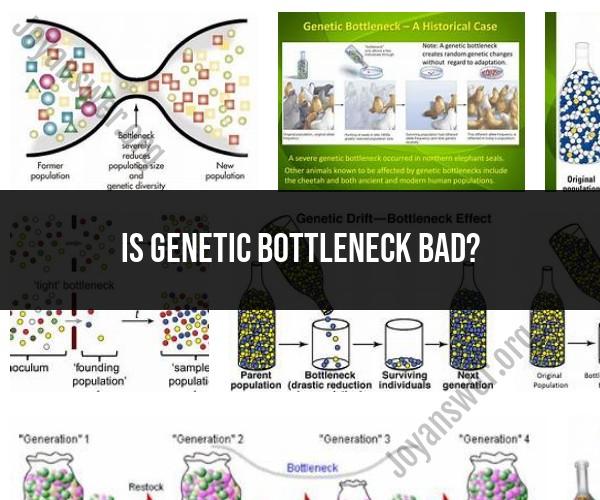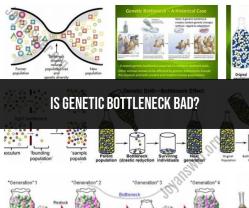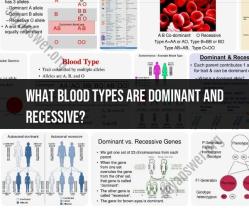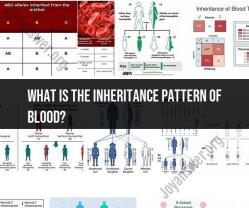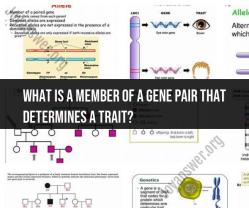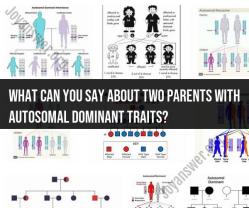Is genetic bottleneck bad?
A genetic bottleneck can have both negative and positive consequences, depending on the context and the specific circumstances. Here's a breakdown of the causes and potential consequences of genetic bottlenecks:
Causes of Genetic Bottleneck:A genetic bottleneck occurs when a population experiences a significant reduction in its size, often due to environmental factors, catastrophic events, or human activities. Common causes include:
Natural Disasters: Events like earthquakes, floods, wildfires, and volcanic eruptions can reduce the size of a population quickly.
Human Activities: Habitat destruction, pollution, overhunting, and other human-induced factors can lead to population declines.
Disease Outbreaks: An epidemic or disease outbreak within a population can result in a sudden reduction in numbers.
Founder Effect: When a small group of individuals from a larger population colonizes a new area, the genetic diversity of the new population may be limited to the genes carried by those founders.
Consequences of Genetic Bottleneck:
Loss of Genetic Diversity: One of the most significant consequences of a genetic bottleneck is the loss of genetic diversity. With a smaller population, fewer genetic variations are present, which can make the population less adaptable to changing environments.
Increased Risk of Inbreeding: Smaller populations are more likely to experience inbreeding, where individuals mate with close relatives. Inbreeding can lead to a higher prevalence of genetic disorders and reduced fitness in offspring.
Reduced Adaptability: Limited genetic diversity can reduce a population's ability to adapt to changing environmental conditions, making it more vulnerable to extinction if faced with new challenges.
Lowered Fitness: Reduced genetic diversity may result in lower overall fitness and reproductive success, as beneficial genetic traits become less prevalent in the population.
Loss of Rare Traits: Unique or rare genetic traits may be lost during a bottleneck event, which can have ecological or conservation implications, especially if those traits are beneficial in specific contexts.
Increased Vulnerability to Disease: Populations with reduced genetic diversity may be more susceptible to diseases, as there may be fewer individuals with genetic resistance to specific pathogens.
Positive Aspects of Genetic Bottleneck:
While genetic bottlenecks are generally associated with negative consequences, there are some situations in which they can have positive outcomes:
Selective Advantage: In rare cases, a bottleneck may lead to a population with a set of genetic traits that are advantageous in a particular environment. This can lead to increased fitness in that specific context.
Conservation Efforts: In conservation biology, controlled genetic bottlenecks may be employed to manage populations of endangered species, often as a last resort to prevent extinction. This can help reduce the immediate threats facing the population.
In summary, genetic bottlenecks are generally considered detrimental because they lead to reduced genetic diversity and increased vulnerability to various risks. However, in some situations, they can have positive outcomes or be necessary for conservation efforts to prevent extinction. The impact of a genetic bottleneck depends on the severity of the event, the population size before and after the bottleneck, and the subsequent evolutionary pressures on the population.
Whether a genetic bottleneck is harmful or beneficial for a population depends on a number of factors, including the severity of the bottleneck, the rate at which the population recovers, and the selection pressures acting on the population.
Potential negative effects of genetic bottlenecks
- Reduced genetic diversity: Genetic bottlenecks can lead to a reduction in genetic diversity, which can make a population more susceptible to disease and environmental changes.
- Increased inbreeding: Genetic bottlenecks can also lead to an increase in inbreeding, which can lead to the expression of harmful recessive alleles.
- Loss of adaptive alleles: Genetic bottlenecks can also lead to the loss of adaptive alleles, which can make it more difficult for a population to adapt to changing environmental conditions.
Potential positive effects of genetic bottlenecks
- Removal of deleterious alleles: Genetic bottlenecks can also lead to the removal of deleterious alleles from a population.
- Increased genetic drift: Genetic bottlenecks can also increase the rate of genetic drift, which can lead to the rapid evolution of new traits.
- Founder effect: Genetic bottlenecks can also lead to the founder effect, which is when a new population is established by a small number of individuals. This can lead to the establishment of new genetic variants in the population.
Overall, the impact of a genetic bottleneck on a population will depend on the specific circumstances. In some cases, genetic bottlenecks can be harmful, while in other cases, they can be beneficial.
Here are some examples of the positive and negative impacts of genetic bottlenecks in the wild:
- Negative impact: The population of northern white rhinos has been reduced to just two individuals due to poaching and habitat loss. This genetic bottleneck has led to a reduction in genetic diversity and an increase in inbreeding, which has made the population more susceptible to disease and extinction.
- Positive impact: The cheetah population is thought to have gone through several genetic bottlenecks in its evolutionary history. These bottlenecks have led to a reduction in genetic diversity, but they have also led to the selection of certain adaptive traits, such as the cheetah's speed and agility.
Conclusion
Genetic bottlenecks can have both positive and negative impacts on populations. It is important to understand the factors that can influence the impact of a genetic bottleneck in order to make informed decisions about conservation and management strategies.
